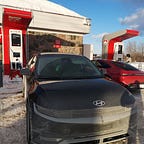How US states and cities support charging for non-homeowners
We could learn some lessons from EV-friendly cities and states
Charging your EV at your own single family home is pretty straightforward. If you rent or if you live in an apartment, it can take a bit more forethought, but this article from the Washington Post puts the problems into perspective. I have written about the general issues and solutions in a previous piece, but I found it interesting to see how cities and states in the US are dealing with those issues, and it is as good a reason as any to shine a light on how better city and provincial policies could make a huge difference in enabling EV infrastructure and save taxpayer money too!
Ten states have “right-to-charge” laws on the books. In California and Colorado, for example, renters or homeowners have the right to install charging at their private parking space or, in some cases, in a public area at their apartment building. Other states, including Florida, Hawaii and New Jersey, have similar but limited laws.
This would be great to see — though with apartment buildings installing charging infrastructure with the help of the landlord or coop board and for the benefit of several tenants collectively would usually be much cheaper and more efficient than anything an individual could do on their own.
EV advocacy groups are working on changing building codes in cities and states so that all multifamily homes with parking have to be “EV-ready.” “EV-ready” spaces have upgraded electrical panels and conduit running to the space — making it up to 10 times cheaper to ultimately install a charger
I would go further and hope that this could be a requirement for any new builds — residential or small business. Housing lasts decades — shouldn’t we make sure they are built with an EV future in mind?
Drivers who park on the street have found novel ways to charge their vehicles, using extension cords running over the sidewalk or even into the branches of a nearby tree.
Drivers in these situations should be careful not to run afoul of local laws. But some municipalities explicitly allow over-the-sidewalk charging as part of a broader strategy to cut transportation emissions. In D.C., for example, residents are allowed to charge their cars with an extension cord as long as they provide a highly visible ramp over the cord for accessibility concerns. Cambridge, Mass., and Seattle have similar rules in place.
The City of Vancouver had a fight over this a few years ago and I thought at that point that the accessibility community had successfully lobbied to prevent cords going over sidewalks even if covered with a visible ramp. But I see that they are now issuing EV cable cover licenses. In Toronto, unfortunately, city staff so far have chosen to block this relatively easy and cost-free option because of concern (mainly) over risks when snow clearing. There’s plenty of snow in Cambridge, Mass…
For more on this from a Canadian perspective there’s a good recent CBC story looking at the situation in Toronto, Vancouver and Windsor, Ont. Toronto recognizes it needs more EV charging infrastructure, but because it is not willing to accommodate car owners running cables over sidewalks (cost to city and to owners close to $0), its alternative solution is to publicly provide charging stations which cost them $20,000 apiece to install (the same speed as ones domestic users can buy and install for $1,000 or less!) and which they will then therefore have to charge users $2+ per hour to access. A similar situation exists where I live in St John’s…
The moral of the story? Politicians can get credit for supporting EVs by cutting ribbons on costly public infrastructure, but a little forward thinking on development regulations and acceptance of risk might accomplish a lot more at less cost. If you want to ensure your community has better support for EVs and you are thinking of talking to local politicians about it, maybe show them this?
